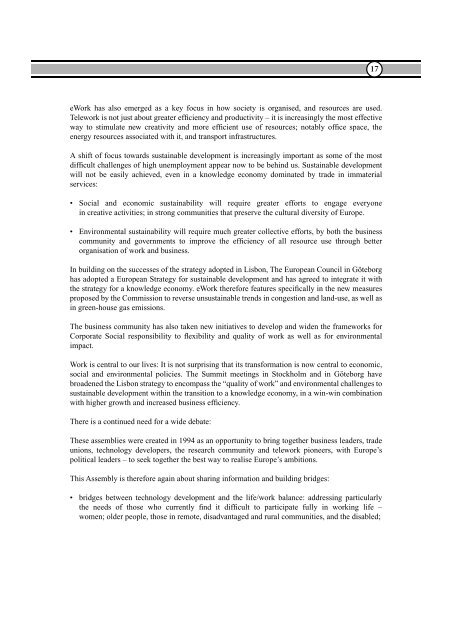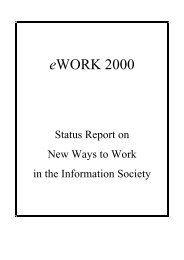Proceedings of 8th European Assembly on telework (Telework2001)
Proceedings of 8th European Assembly on telework (Telework2001)
Proceedings of 8th European Assembly on telework (Telework2001)
You also want an ePaper? Increase the reach of your titles
YUMPU automatically turns print PDFs into web optimized ePapers that Google loves.
17eWork has also emerged as a key focus in how society is organised, and resources are used.Telework is not just about greater efficiency and productivity – it is increasingly the most effectiveway to stimulate new creativity and more efficient use <str<strong>on</strong>g>of</str<strong>on</strong>g> resources; notably <str<strong>on</strong>g>of</str<strong>on</strong>g>fice space, theenergy resources associated with it, and transport infrastructures.A shift <str<strong>on</strong>g>of</str<strong>on</strong>g> focus towards sustainable development is increasingly important as some <str<strong>on</strong>g>of</str<strong>on</strong>g> the mostdifficult challenges <str<strong>on</strong>g>of</str<strong>on</strong>g> high unemployment appear now to be behind us. Sustainable developmentwill not be easily achieved, even in a knowledge ec<strong>on</strong>omy dominated by trade in immaterialservices:• Social and ec<strong>on</strong>omic sustainability will require greater efforts to engage every<strong>on</strong>ein creative activities; in str<strong>on</strong>g communities that preserve the cultural diversity <str<strong>on</strong>g>of</str<strong>on</strong>g> Europe.• Envir<strong>on</strong>mental sustainability will require much greater collective efforts, by both the businesscommunity and governments to improve the efficiency <str<strong>on</strong>g>of</str<strong>on</strong>g> all resource use through betterorganisati<strong>on</strong> <str<strong>on</strong>g>of</str<strong>on</strong>g> work and business.In building <strong>on</strong> the successes <str<strong>on</strong>g>of</str<strong>on</strong>g> the strategy adopted in Lisb<strong>on</strong>, The <str<strong>on</strong>g>European</str<strong>on</strong>g> Council in Göteborghas adopted a <str<strong>on</strong>g>European</str<strong>on</strong>g> Strategy for sustainable development and has agreed to integrate it withthe strategy for a knowledge ec<strong>on</strong>omy. eWork therefore features specifically in the new measuresproposed by the Commissi<strong>on</strong> to reverse unsustainable trends in c<strong>on</strong>gesti<strong>on</strong> and land-use, as well asin green-house gas emissi<strong>on</strong>s.The business community has also taken new initiatives to develop and widen the frameworks forCorporate Social resp<strong>on</strong>sibility to flexibility and quality <str<strong>on</strong>g>of</str<strong>on</strong>g> work as well as for envir<strong>on</strong>mentalimpact.Work is central to our lives: It is not surprising that its transformati<strong>on</strong> is now central to ec<strong>on</strong>omic,social and envir<strong>on</strong>mental policies. The Summit meetings in Stockholm and in Göteborg havebroadened the Lisb<strong>on</strong> strategy to encompass the “quality <str<strong>on</strong>g>of</str<strong>on</strong>g> work” and envir<strong>on</strong>mental challenges tosustainable development within the transiti<strong>on</strong> to a knowledge ec<strong>on</strong>omy, in a win-win combinati<strong>on</strong>with higher growth and increased business efficiency.There is a c<strong>on</strong>tinued need for a wide debate:These assemblies were created in 1994 as an opportunity to bring together business leaders, tradeuni<strong>on</strong>s, technology developers, the research community and <strong>telework</strong> pi<strong>on</strong>eers, with Europe’spolitical leaders – to seek together the best way to realise Europe’s ambiti<strong>on</strong>s.This <str<strong>on</strong>g>Assembly</str<strong>on</strong>g> is therefore again about sharing informati<strong>on</strong> and building bridges:• bridges between technology development and the life/work balance: addressing particularlythe needs <str<strong>on</strong>g>of</str<strong>on</strong>g> those who currently find it difficult to participate fully in working life –women; older people, those in remote, disadvantaged and rural communities, and the disabled;








